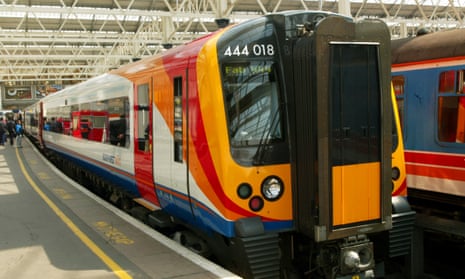The Hong Kong state-owned metro operator MTR and FirstGroup are to take over the running of South West Trains, one of the Britain’s biggest commuter networks, in a seven-year deal that trade unions denounced for handing another franchise to a state-controlled foreign operator.
First MTR will operate the franchise from August, promising to deliver faster and more frequent services across southern England to and from London Waterloo, with new trains and timetables providing 20% more seats in the morning rush hour.
The operator will pay £2.6bn in premiums to the government over the next seven years, of which £1.2bn will be reinvested in the railway, according to the terms of the deal.
First MTR will take over from Stagecoach, which has operated the South West Trains franchise since the UK rail network was privatised in 1996.
The Rail, Maritime and Transport (RMT) union said the Chinese company – which also has the contract to operate trains on the Crossrail route in London – was set to make “a killing at the British taxpayers’ expense” as it joined the Dutch, German, Italian and French national rail operators in running private franchises in the UK. MTR is majority-owned by the Hong Kong government.
In Britain, a government-owned operator has been used only when a franchise has failed, for instance when National Express abandoned its east coast contract in 2009. But the government said the agreement would mean better services for passengers and heralded a new era in rail transport by uniting train and track operations.
The deal is the first since the government said it planned to bring together train and track operations.
The transport secretary, Chris Grayling, said: “First MTR South Western Trains will deliver the improvements that people tell us they want right across the South Western franchise area, from Bristol and Exeter, to Southampton and Portsmouth, to Reading, Windsor and London.
“We are delivering the biggest rail modernisation programme for over a century and this franchise will deliver real changes for passengers, who can look forward to modern trains, faster journeys and a more reliable service.”
Tim O’Toole, the chief executive of First Group, which owns 70% of the joint venture with MTR, said that it was “gratifying” to have won such a large franchise after seeing its rail business in the UK decline in recent years.
O’Toole said MTR, which operates the Hong Kong metro, was “the perfect partner” for SWT: “MTR’s reputation is around the world for disciplined operating practices for a high-frequency commuter service.”
He said that the £2.6bn contract represented a “disciplined” bid, and that the operator would be compensated should Brexit lead to economic decline. The terms of the deal will reduce payments should GDP and employment in London fall. “It does allow us to balance off some of the risk for Brexit. Though plainly the risk is here for us.”
Mick Cash, general secretary of the RMT, pointed out that the deal would mean about 75% of UK rail routes would soon be operated by state-owned foreign companies, after an Italian state firm took over C2C.
“Once again the government has refused to consider the public sector option for a major rail franchise and instead it’s a foreign state operator, in this case the Chinese state, which is set to make a killing at the British taxpayers’ expense,” he said.
“That is nothing short of a scandal and reinforces the demand for nationalisation of our rail assets for the benefit of the British passenger and taxpayer. The nonsense is that, with the government triggering article 50 this week, they would be free to ignore EU rail directives that slam a block on public ownership.
“It is, frankly, ludicrous that the Tories are continuing with the ‘any state but the British state’ policy which has plundered our railways for over two decades.”
The RMT said it would seek an early meeting with First MTR for guarantees on jobs and the role of the guards on the network, after disputes that have resulted in strikes and widespread disruption on the neighbouring Southern franchise.
O’Toole said: “We’ll engage with unions through normal machinery but it doesn’t do any good to talk about that now. There are changes all the time across all the business for management and all the employees involved. But there’s nothing frightening or disruptive about what’s [ahead].”
First MTR South Western Trains Limited has pledged to oversee a £1.2bn investment programme, that includes providing 22,000 extra seats into London Waterloo each morning peak and 30,000 extra seats out of the station each evening.
It also includes a fleet of 90 new trains, refurbished existing trains, faster journeys across the network and more Sunday services.
Anthony Smith, the chief executive of the independent watchdog Transport Focus, said: “Passengers using trains on the South West network told us their main priorities for a new operator are boosting reliability and more space to sit and stand in some comfort. They also want to see a better train experience, stations modernised and improved information.”
Stagecoach said it was disappointed that it had been unsuccessful in its bid for the franchise. Its group chief executive, Martin Griffiths, said: “We are proud to have operated the network under the South West Trains brand for more than 20 years.”
The South West Trains network includes commuter services out of Waterloo to the south-west London suburbs and longer distance trains to destinations including Southampton, Portsmouth, Bournemouth and Exeter.
